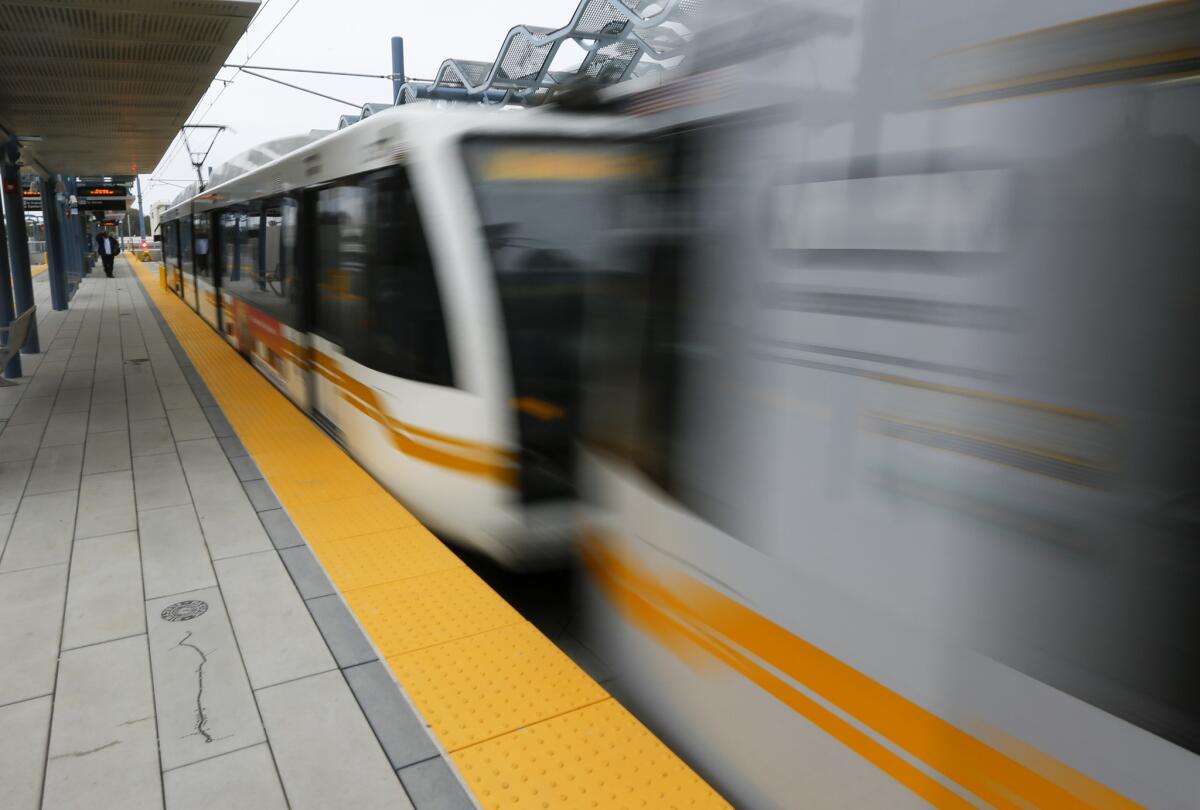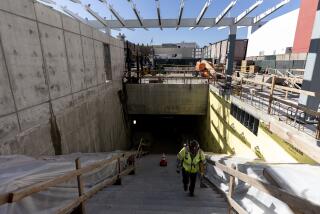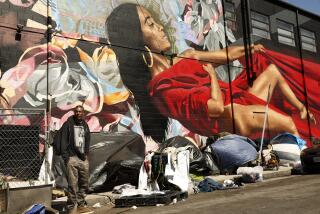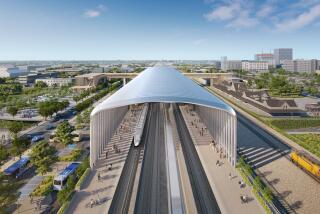Metro puts half-cent sales tax increase for transportation projects on November ballot

Los Angeles County transportation officials said Thursday they will seek voter approval in November for a half-cent sales tax increase to fund a major expansion of Southern California’s rail and highway network.
The Metropolitan Transportation Authority board of directors voted 11-2 to place a tax increase proposal on the November ballot that would generate at least $860 million per year for street repairs, highway improvements and new rail construction, including lines in the Sepulveda Pass and Van Nuys and extensions to Claremont and West Hollywood.
Metro’s proposal, one of the most ambitious in modern U.S. history, could transform a traffic-choked region that began building a modern rail system decades after other major cities. The expenditure plan calls for several north-south links in a rail network that runs largely east to west.
The tax, which has no end date, would increase the county’s base sales tax rate to 9.5% and push the rate to 10% in some cities, including Santa Monica and Commerce. If the tax were approved, two cents for every dollar spent in the county would fund transportation improvements. It would require a two-thirds’ vote to pass.
Critics have said the so-called “Los Angeles County Traffic Improvement Plan” could spark financial woes for Metro, which sometimes struggles to manage the budget it has now. The widening of the 405 Freeway was completed years behind schedule, and the budget for a new rail connection through downtown Los Angeles has increased by $130 million, or 9%.
The measure’s tax revenue also would fully or partially fund 10 new highway projects, including an extension of State Route 71 and a new carpool-lane interchange between the 405 and 110 freeways.
Metro’s plan would return 17% of tax revenue to cities for transportation investments, including road repairs. It also would fund Metrolink, bus and rail operations and repairs, and pedestrian and bicycle improvements.
Board members Diane DuBois, a Lakewood city councilwoman, and Los Angeles County Supervisor Don Knabe voted against the measure.
“There’s a strong belief that the county is tilted, and we need to fix that tilt,” DuBois said, adding that the geographic distribution of projects was not equal.
Knabe said the plan prioritizes new projects over rail lines promised to voters through Measure R, the half-cent sales tax increase that voters approved in 2008.
During nearly three hours of public testimony, dozens of elected officials and taxpayers asked Metro for last-minute changes to the plan, primarily accelerating the ribbon-cuttings for projects that would be funded with the new tax.
Others urged Metro to improve service for bus riders. At one point, members of the Fight for the Soul of the Cities advocacy group began to chant, “Free buses, not freeways.”
Knabe said that dozens of projects currently listed in the proposal could be moved back or removed in the future with a two-thirds vote of the Metro board.
“When you’re handed an open checkbook, it becomes a real accountability factor,” Knabe said, asking the board for stricter controls on projects and budgets. “This is a forever tax. I mean, forever. The accountability needs to be there.”
Metro Chief Executive Phil Washington said the ordinance would allow the board only to speed up construction on some projects, and not at the expense of funding for other projects.
Other speakers asked the board to postpone the measure for two years to allow for further changes. To cheers and laughter, one elderly woman told the board: “Like sex, we want it, but we don’t want it quick — we want it right.”
Representatives from southeast cities urged Metro to further accelerate the schedule for the West Santa Ana Branch, a 19-mile light-rail line that would connect Union Station with Artesia. The line would pass through a group of poor, transit-dependent cities, including Downey, Bellflower and Huntington Park.
After pressure from local representatives, including state Sen. Anthony Mendoza (D-Artesia) and Senate President Pro Tem Kevin de León (D-Los Angeles), Metro changed its expenditure plan to bump up the line’s ribbon-cutting from 2047 to 2041, and noted the project could open as early as 2037 with funding from the private sector.
But the same project had received seed funding and a tentative opening date of 2027 under Measure R.
“It’s important to keep the promise to voters,” said Karina Macias, a councilwoman from Huntington Park. “No bait and switch. We want you to do the right thing.”
On Thursday morning, Mendoza said he would reintroduce a state bill that would add 10 members to the Metro board, which he said would “ensure [Metro] more fairly and equitably represents all of Los Angeles County’s 10 million residents.” A previous attempt to pass the legislation failed earlier this month.
Others urged the Metro board to accelerate the timeline for a proposed northern extension of the Crenshaw Line, currently slated to begin service in 2047. The line could connect with the Purple Line along Wilshire Boulevard and the Red Line in Hollywood and could curve into nightlife-rich West Hollywood, which traditionally has had some of the highest voter support of any city for Metro tax measures.
Metro also heard criticism from advocates in South Los Angeles, who have sought funding for a tunnel along a one-mile section of the Crenshaw Line that is designed to run at street level in Park Mesa Heights.
“We don’t have a name for this measure yet, but how about Measure N — for ‘never going to pass,’ or ‘never going to happen?’ ” said Damien Goodmon, the head of the Crenshaw Subway Coalition. Without funding for the tunnel, he said, he would urge South L.A. residents to vote against the tax measure.
A motion introduced by Los Angeles Mayor Eric Garcetti that passed unanimously will include funding for a bus-rapid transit line in the north San Fernando Valley that would connect to Cal State Northridge and open in 2023.
Under Measure R, the San Fernando Valley “was largely left out of the equation, and was not treated fairly and was not treated equitably,” said Los Angeles City Councilman and director Paul Krekorian.
For more transportation news, follow @laura_nelson on Twitter.
ALSO
Ventura County oil spill misses beach, but damage on land is unclear
Led Zeppelin didn’t steal music for ‘Stairway to Heaven,’ jury finds
Immigrant rights activists vow to keep fighting after Supreme Court deadlock
UPDATES:
5:35 p.m.: This article was updated to clarify the context of a quote from City Councilman Paul Krekorian.
This article was originally published at 3:00 p.m.
More to Read
Start your day right
Sign up for Essential California for news, features and recommendations from the L.A. Times and beyond in your inbox six days a week.
You may occasionally receive promotional content from the Los Angeles Times.






